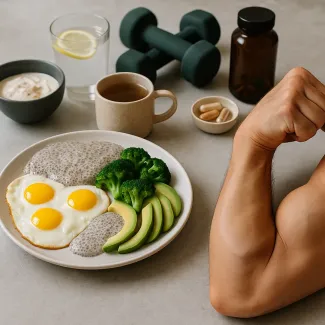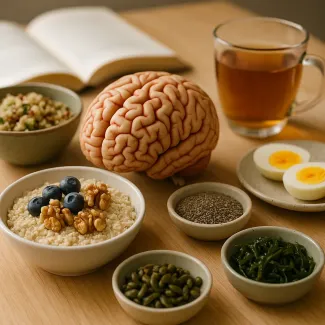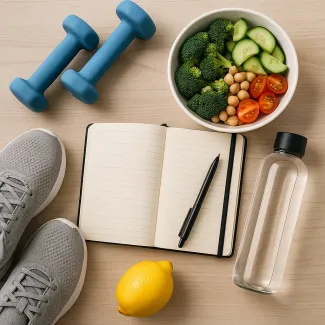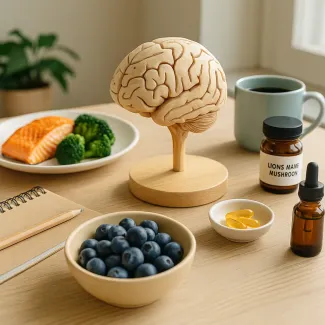
When Energy Starts to Feel Different After 30
A Systems View of Fatigue Beyond Simple “Low Vitamins”
Energy in your 30s rarely disappears overnight. It shifts. Morning clarity may feel softer. Recovery after a late night may take longer. Mental focus may fluctuate in ways it did not in your 20s. This change is often gradual and layered, which is why single-supplement thinking rarely explains the full picture.
After 30, energy becomes a systems issue. Nutrients, hormones, sleep architecture, stress load, and metabolic signals all begin interacting more visibly. Fatigue is often not one deficiency but a pattern.
Why Energy Shifts After 30
In your 30s, life complexity increases. Work responsibility, caregiving, irregular sleep, and subtle metabolic changes begin overlapping. At the same time:
- Iron stores may slowly decline.
- Vitamin D levels fluctuate with indoor work.
- Magnesium intake often falls below optimal.
- Stress reactivity becomes more pronounced.
- Thyroid regulation can subtly shift.
- Sleep becomes lighter and more fragmented.
None of these alone guarantees low energy. Together, they can create the experience of “never fully recharging.”
Nutrient-Related Causes
Vitamin B12
Vitamin B12 plays a role in red blood cell formation and neurological function. When levels are low, people may notice reduced stamina, slower thinking, or persistent tiredness. It is not always dramatic. Sometimes it feels like a dimmer switch slowly turned down.
If laboratory results suggest a low B12 pattern, deeper context matters. A more detailed explanation of symptom patterns is covered here:
Low Vitamin B12 on Blood Tests: Fatigue, Brain Fog and Tingling Explained
In a broader energy framework, B12 is one factor among many. It supports cellular energy processes, but it does not override sleep debt, chronic stress, or low iron.
Iron and Ferritin
Iron supports oxygen transport. Ferritin reflects stored iron. Even when hemoglobin appears normal, low ferritin can correlate with reduced endurance, especially in women. The sensation is often described as “heaviness” rather than acute exhaustion.
Iron-related fatigue is rarely isolated. It may coexist with menstrual changes, dietary shifts, or chronic stress.
Magnesium
Magnesium participates in hundreds of enzymatic reactions, including muscle relaxation and nervous system regulation. Low intake may show up as tension, poor sleep quality, or subtle restlessness. Over time, this compounds energy decline.
Magnesium does not directly “boost” energy. It supports recovery. That distinction matters.
Vitamin D
Vitamin D influences immune regulation, mood stability, and musculoskeletal function. In indoor lifestyles, low levels are common. The effect on energy is often diffuse—less resilience, slower bounce-back after stress.
Hormonal Contributors
Energy after 30 becomes more hormonally sensitive.
Thyroid Regulation
Thyroid hormones influence metabolic pace. Subclinical shifts may manifest as feeling colder, mentally slower, or less motivated. Not all fatigue is thyroid-related, but persistent low energy combined with other subtle symptoms warrants contextual evaluation.
Cortisol and Stress Patterns
Chronic stress alters cortisol rhythms. Instead of a clear morning peak and gradual decline, patterns can flatten or spike unpredictably. The result: wired at night, tired in the morning.
Stress-driven fatigue often feels paradoxical—restless yet depleted.
Lifestyle Drivers
Sleep Architecture
Sleep in your 30s can become lighter. Blue light exposure, mental load, and irregular routines reduce deep restorative stages. Even 7–8 hours in bed may not equal true recovery.
Cognitive Load
Constant decision-making and digital stimulation create mental fatigue distinct from physical tiredness. Energy feels drained even when the body is not physically overworked.
Nutrition Timing and Blood Sugar
Irregular meals or highly refined carbohydrate intake may lead to energy dips. These are often mid-afternoon crashes rather than constant fatigue.
Decision Logic: How to Think Systemically
Instead of asking, “Which supplement is best?” a more useful question is:
What pattern is present?
- Persistent low stamina → consider iron and ferritin context.
- Mental fog with neurological sensations → include B12 in evaluation.
- Tension and poor sleep → assess magnesium and stress load.
- Low mood in winter months → check vitamin D exposure.
- Slowed metabolism signs → explore thyroid function.
Energy restoration after 30 is rarely about adding one capsule. It is about identifying the dominant driver within a network.
B12 may be part of the solution. Iron may matter more. For some, sleep repair shifts everything. For others, stress reduction restores more energy than any nutrient.
The most sustainable approach integrates nutrients, hormones, sleep, and lifestyle as a system—because after 30, energy is no longer a single variable.
FAQ questionIs it normal to feel more tired in your 30s even if nothing major has changed?
Yes, it is commonly mentioned that energy in the 30s feels different rather than dramatically lower. In this stage of life, responsibilities often increase while recovery time subtly decreases. In such a context, people usually notice that sleep feels lighter, stress lingers longer, or motivation fluctuates more than it used to.
It is not always about a single nutrient. It is often connected to cumulative load — work pressure, mental multitasking, reduced sunlight exposure, and dietary shifts. Over time, this layered effect can be perceived as “background fatigue.”
Editor’s note: In practice, many people first notice this shift on ordinary mornings, not during extreme stress. The signal is often subtle: getting through the day feels possible, but not effortless.
FAQ questionIf my labs are “within range,” why do I still feel low on energy?
This is a common question. In everyday life, being “within range” does not always mean optimal for how someone feels. Lab reference intervals reflect population averages, not individual experience.
In such situations, people often describe steady but uninspiring energy rather than acute exhaustion. It can be useful to consider the broader context: ferritin levels, vitamin D exposure, sleep depth, stress rhythm, and even thyroid patterns. Fatigue with normal labs is often a systems issue rather than a single red flag.
Practical note: From an editorial perspective, it is interesting how often mild fatigue appears alongside fragmented sleep or prolonged stress, even when blood tests do not look dramatic.
FAQ questionWhat if I take vitamin B12 but still feel drained?
This scenario is more common than many assume. Vitamin B12 is often discussed when fatigue is present, but energy regulation rarely depends on one factor alone. In everyday contexts, people may notice that B12 supports mental clarity, yet overall stamina remains inconsistent.
This is frequently connected to overlapping contributors such as low ferritin, magnesium intake, thyroid sensitivity, or chronic stress. When fatigue has multiple layers, adding a single nutrient may not fully change the experience. It is often more helpful to look at patterns — sleep rhythm, stress load, nutritional consistency — rather than focusing on one supplement.
FAQ questionCould working indoors most of the week really affect my energy that much?
In many urban settings, people spend most of their day inside — commuting, working at a desk, and unwinding in front of screens. Over time, reduced sunlight exposure is often associated with lower vitamin D levels and a sense of reduced resilience.
In such contexts, individuals may describe feeling “flat” rather than sharply exhausted. This can also intersect with disrupted circadian rhythms from artificial light in the evening. It makes sense in everyday life to think about how light exposure, sleep timing, and stress all connect.
Energy after 30 is rarely about a single dramatic cause. It is usually about how modern routines subtly reshape recovery and resilience.





